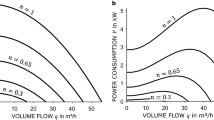Abstract
Successful optimization requires an appropriate model of the system under consideration. When selecting a suitable level of detail, one has to consider solution quality as well as the computational and implementation effort. In this paper, we present a MINLP for a pumping system for the drinking water supply of high-rise buildings. We investigate the influence of the granularity of the underlying physical models on the solution quality. Therefore, we model the system with a varying level of detail regarding the friction losses, and conduct an experimental validation of our model on a modular test rig. Furthermore, we investigate the computational effort and show that it can be reduced by the integration of domain-specific knowledge.
Access this chapter
Tax calculation will be finalised at checkout
Purchases are for personal use only
Similar content being viewed by others
Notes
- 1.
Equation only active if friction is considered.
- 2.
Equation only active if dual bound is considered.
References
Alexander, M., et al.: Mathematical Optimization of Water Networks. Springer, New York (2012)
Altherr, L., Leise, P., Pfetsch, M.E., Schmitt, A.: Resilient layout, design and operation of energy-efficient water distribution networks for high-rise buildings using MINLP. Optim. Eng. 20(2), 605–645 (2019)
DIN 1988-500:2011-02: Codes of practice for drinking water installations (2011)
Gleixner, A., et al.: The SCIP Optimization Suite 5.0. Berlin (2017)
Hirschberg, R.: Lastprofil und Regelkurve zur energetischen Bewertung von Druckerhöhungsanlagen. HLH - Heizung, Lüftung, Klima, Haustechnik (2014)
Pöttgen, P., Pelz, P.F.: The best attainable EEI for booster stations derived by global optimization. In: IREC 2016, Düsseldorf
Weber, J.B., Lorenz, U.: Optimizing booster stations. In: GECCO ’17 (2017)
Acknowledgements
Results were obtained in project No. 17482 N/1, funded by the German Federal Ministry of Economic Affairs and Energy (BMWi) approved by the Arbeitsgemeinschaft industrieller Forschungsvereinigungen “Otto von Guericke” e.V. (AiF). Moreover, this research was partially funded by Deutsche Forschungsgemeinschaft (DFG) under project No. 57157498.
Author information
Authors and Affiliations
Corresponding authors
Editor information
Editors and Affiliations
Rights and permissions
Copyright information
© 2020 The Editor(s) (if applicable) and The Author(s), under exclusive license to Springer Nature Switzerland AG
About this paper
Cite this paper
Müller, T.M., Altherr, L.C., Leise, P., Pelz, P.F. (2020). Optimization of Pumping Systems for Buildings: Experimental Validation of Different Degrees of Model Detail on a Modular Test Rig. In: Neufeld, J.S., Buscher, U., Lasch, R., Möst, D., Schönberger, J. (eds) Operations Research Proceedings 2019. Operations Research Proceedings. Springer, Cham. https://doi.org/10.1007/978-3-030-48439-2_58
Download citation
DOI: https://doi.org/10.1007/978-3-030-48439-2_58
Published:
Publisher Name: Springer, Cham
Print ISBN: 978-3-030-48438-5
Online ISBN: 978-3-030-48439-2
eBook Packages: Business and ManagementBusiness and Management (R0)




